Meet Our Staff
DCC Staff Profiles Heading link
-
Director
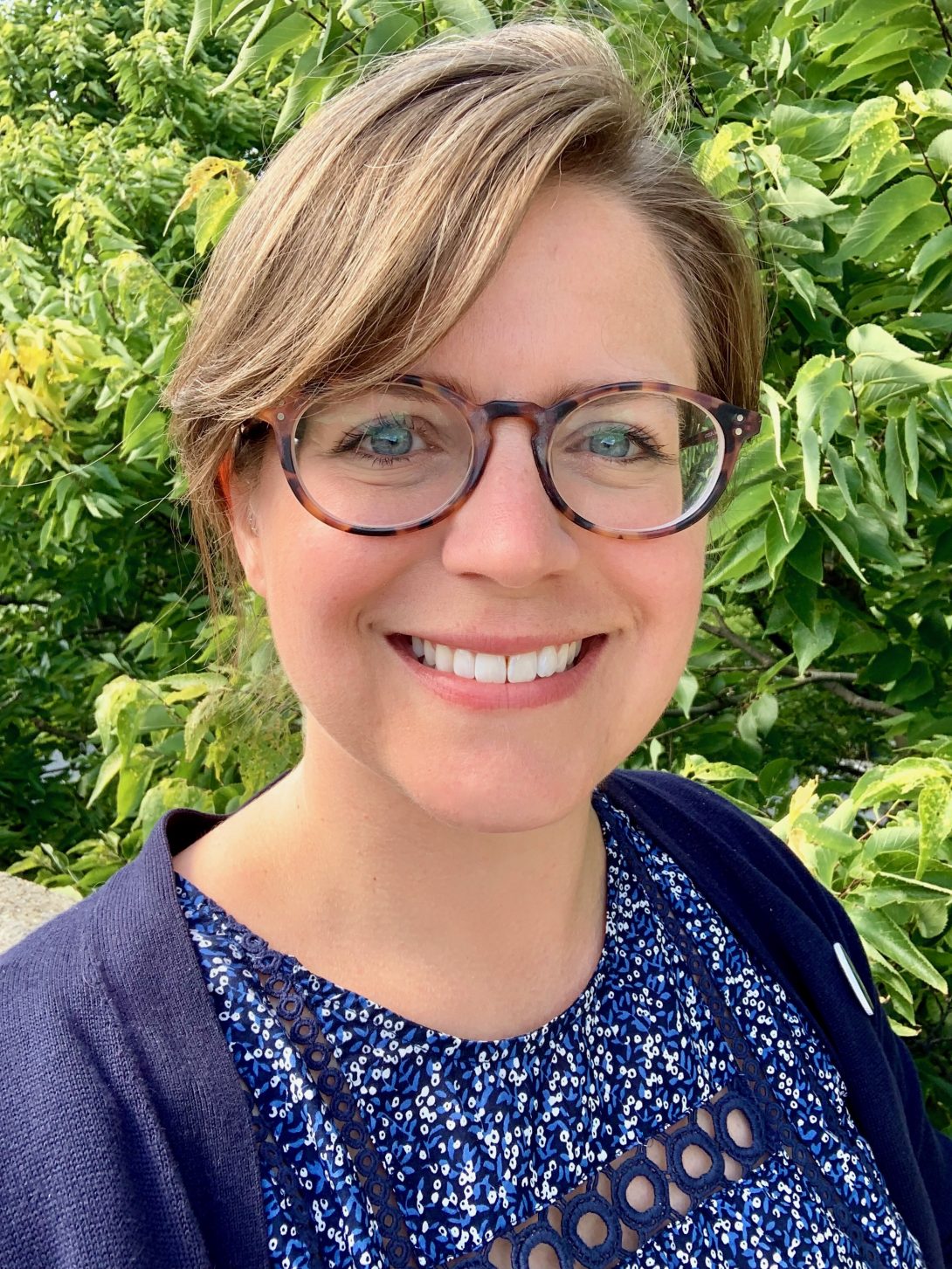 Image description: Margaret, a white woman with brown hair and brown tortoise shell glasses, smiles at the camera while taking a selfie. Margaret is wearing a blue and white patterned blouse and a navy blue cardigan. Behind her are the bright green leaves of the trees outside the BSB building on UIC's campus.
Image description: Margaret, a white woman with brown hair and brown tortoise shell glasses, smiles at the camera while taking a selfie. Margaret is wearing a blue and white patterned blouse and a navy blue cardigan. Behind her are the bright green leaves of the trees outside the BSB building on UIC's campus.I joined the Disability Cultural Center staff as Director in 2019. I identify as a white, cisgender woman who is deaf. As an adult, I’ve learned some sign language, but I grew up mainstreamed in hearing culture.
I received my PhD in English Literature from the University of Chicago, and my academic interests focus around representations of disability and everydayness, particularly the formal choices that build certain concepts of disability in relationship to race. One of my primary questions has been: what can visual representation say, convey, or be ambiguous about that textual representation can’t, and vice versa? These investigations have led me to focus on representation not just in prose novels but also in media like comics and reality tv. (Ask me about the course I taught on reality tv and “anomalous embodiment”!)
Before coming to UIC, my professional background was in writing program administration, where I specialized in academic writing and supporting graduate students–both as teachers of writing, and as writers working in highly specialized discourse communities. While my interests in supporting writers have sometimes felt separate from my interests in disability studies, they come together in two important ways. As an undergrad at UW-Madison, I worked as a peer writing tutor, and being assigned to an Intro to Disability Studies course is how I encountered disability studies for the first time. I thought it “might be interesting,” and it turned out to be a lightbulb moment that nudged me to explore my relationship to disability identity, begin processing my experiences and how they had been narrated to me, and grapple with my own internalized ableism. Also, it was at academic conferences for rhetoricians and writing instructors that I first experienced radical accessibility put into practice. It was hugely transformative to feel, for the first time, that I was invited to ask for what I needed, that I was anticipated and welcome. In these contexts, I learned to think about practices as shaping environments and sending messages.
As I carry these experiences with me, I’m grateful to find a professional home in a cultural center that’s organized around building cross-disability and cross-movement solidarity.
-
Associate Director
I joined the UIC Disability Cultural Center staff as the Associate Director in Summer 2023. One of my main responsibilities at the DCC is facilitating the Community Care Kit Project, including the Community Care Cohort Internship! I identify as a white, queer, nonbinary person with psychiatric disabilities and a chronic illness. I have been given numerous psychiatric labels over the years (some feel accurate, others not so much!). I also have a chronic illness called dysautonomia that I developed after multiple concussions. I am continuously re/un/learning about how to work with and ride the rollercoaster that is autonomic nervous system dysfunction.
I received my PhD from UIC in the Social Foundations of Education, and while I am interested in a lot of different topics, my main focus is on psychiatric disabilities/mental health, students, and education/schooling. I spend a lot of time thinking about systems of power, privilege/oppression, abolition, community care, and disability justice.
My professional life before the DCC included a variety of things from campus programming, to being the director of a Sexuality Summer Institute, to teaching several critical education courses, like Critical Disability Studies in Education and Gender & Sexuality in Education. I received my master’s degree in Sexuality Studies from San Francisco State University, and that is when I was introduced to disability culture for the first time. I went to a Sins Invalid performance in Fall 2009, and it changed my life – I’ve been working to deepen my relationship to disability culture and disability justice ever since!
Other topics you can always talk with me about: I have a cute dog named Motley, in my downtime you can find me playing Zelda on my Switch, camping and hiking are two of my most favorite activities, and I love to cook and bake! -
Program Coordinator
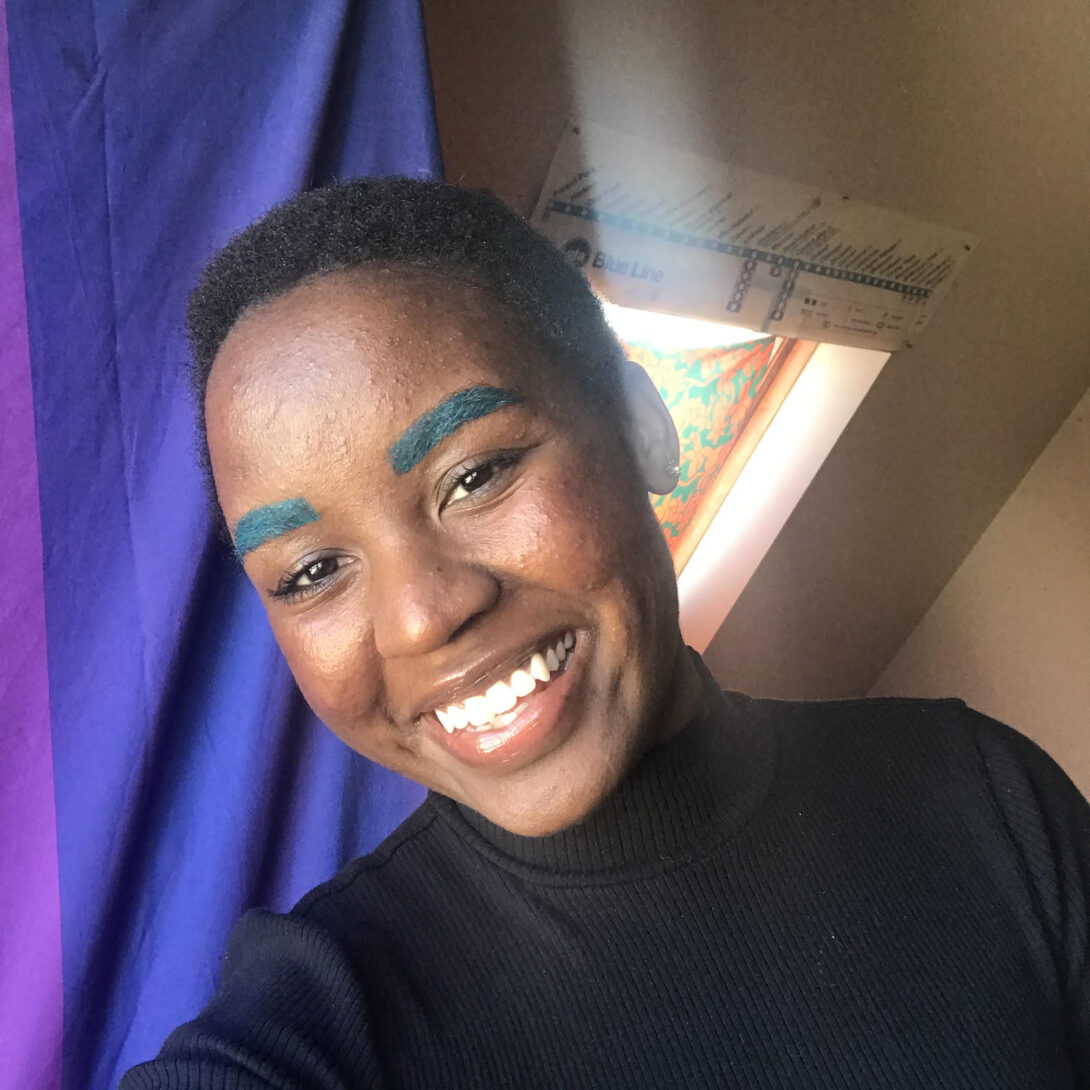 Image description: A selfie of Donna beaming at the camera. They have dark brown skin with orange undertones, short afro hair, a full smile and blue eyebrows. They wear a black turtleneck and hold the camera. Behind them is a bisexual flag and a map of the Blue Line CTA as sunrays come in from a skylight above.
Image description: A selfie of Donna beaming at the camera. They have dark brown skin with orange undertones, short afro hair, a full smile and blue eyebrows. They wear a black turtleneck and hold the camera. Behind them is a bisexual flag and a map of the Blue Line CTA as sunrays come in from a skylight above.I’m Donna Dante Marie Gary, and I go by they/them pronouns. A Chicago native of African American and Cherokee descent, I graduated summa cum laude from New York University’s Gallatin School of Individualized Study, with a focus on the Poetics of Embodiment and Disability Studies.
My poetry activism began at rallies and marches, leading me to perform at venues like The Bowery Poetry Club and The Nuyorican Poets Cafe, with my work published in various notable publications and anthologies.
As a neurodivergent and severely asthmatic individual, my experiences with disability deeply inform my activism. My passion for poetry, performance art, and advocating for marginalized communities fuels my research interests, including Disability Literature and the intersections of identity and activism.
I’ve been actively involved in organizations like the Disability Student Union at NYU and various committees addressing diversity and inclusion issues, bringing valuable insights to my current role at the Disability Cultural Center at UIC.
Influenced by courageous voices like June Jordan, Audre Lorde, Zora Neale Hurston, and Sunaura Taylor, I’m committed to challenging systemic barriers and amplifying marginalized narratives through my work.
-
Febe Frias (They/Them/Theirs)
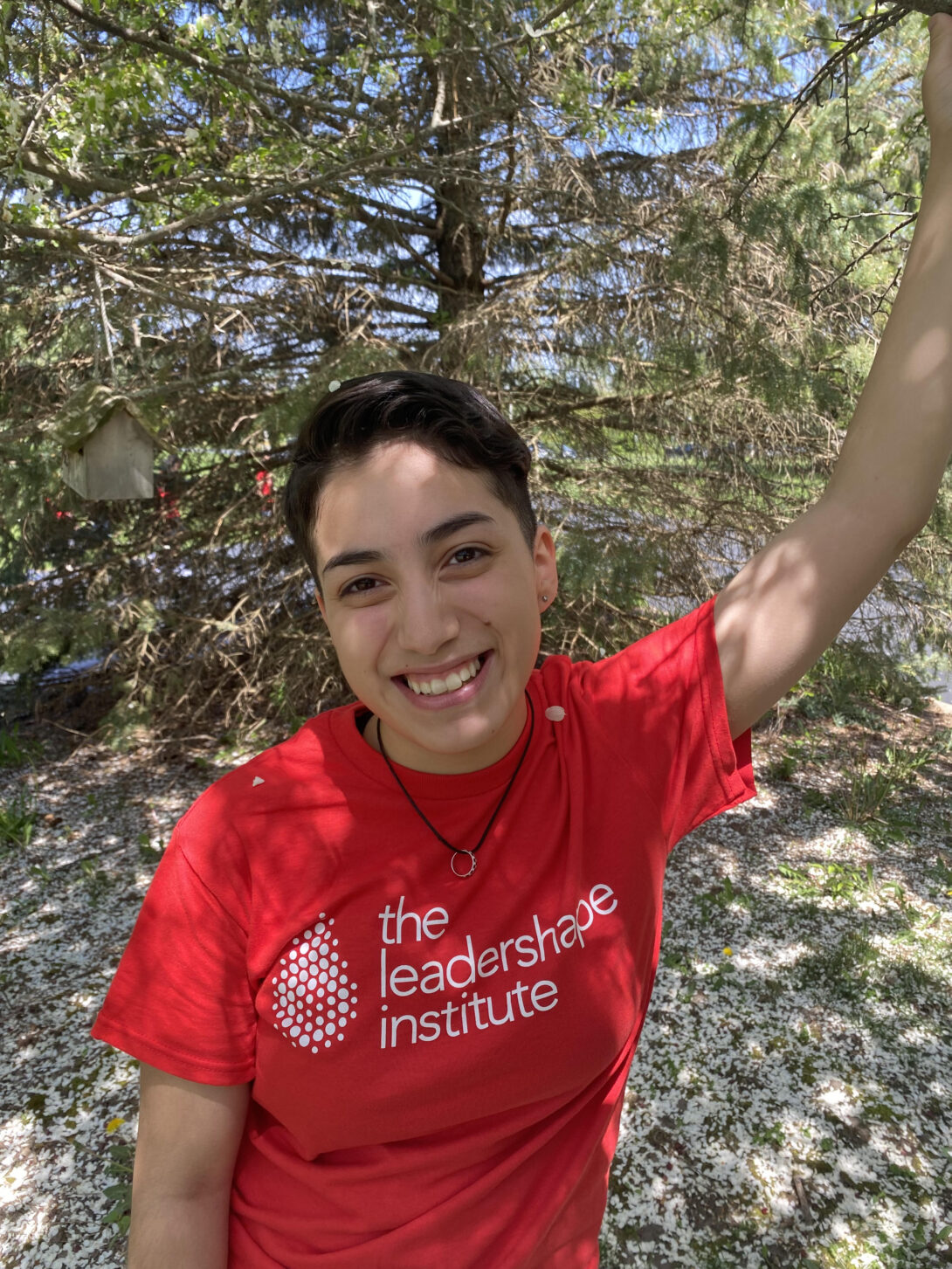 Febe is a Latinx person in a red short sleeve shirt smiling at the camera with one arm raised. Behind them, there is a large pine tree.
Febe is a Latinx person in a red short sleeve shirt smiling at the camera with one arm raised. Behind them, there is a large pine tree.Year & Major: Junior, Public Health major with a minor in Spanish.
Passions and/or research interests: I am passionate about child advocacy, art, and creative writing.
How I connected with the DCC: I connected with the DCC through the Woman’s Leadership and Resource Center when I transferred to UIC. What I most love about the DCC is how they welcome you in with open arms. I love that I can be my most authentic self at the DCC!
Ask me about: Come and talk to me about anything! I enjoy talking to other people especially if it’s art related!
Paloma Araujo (They/Them/Theirs)
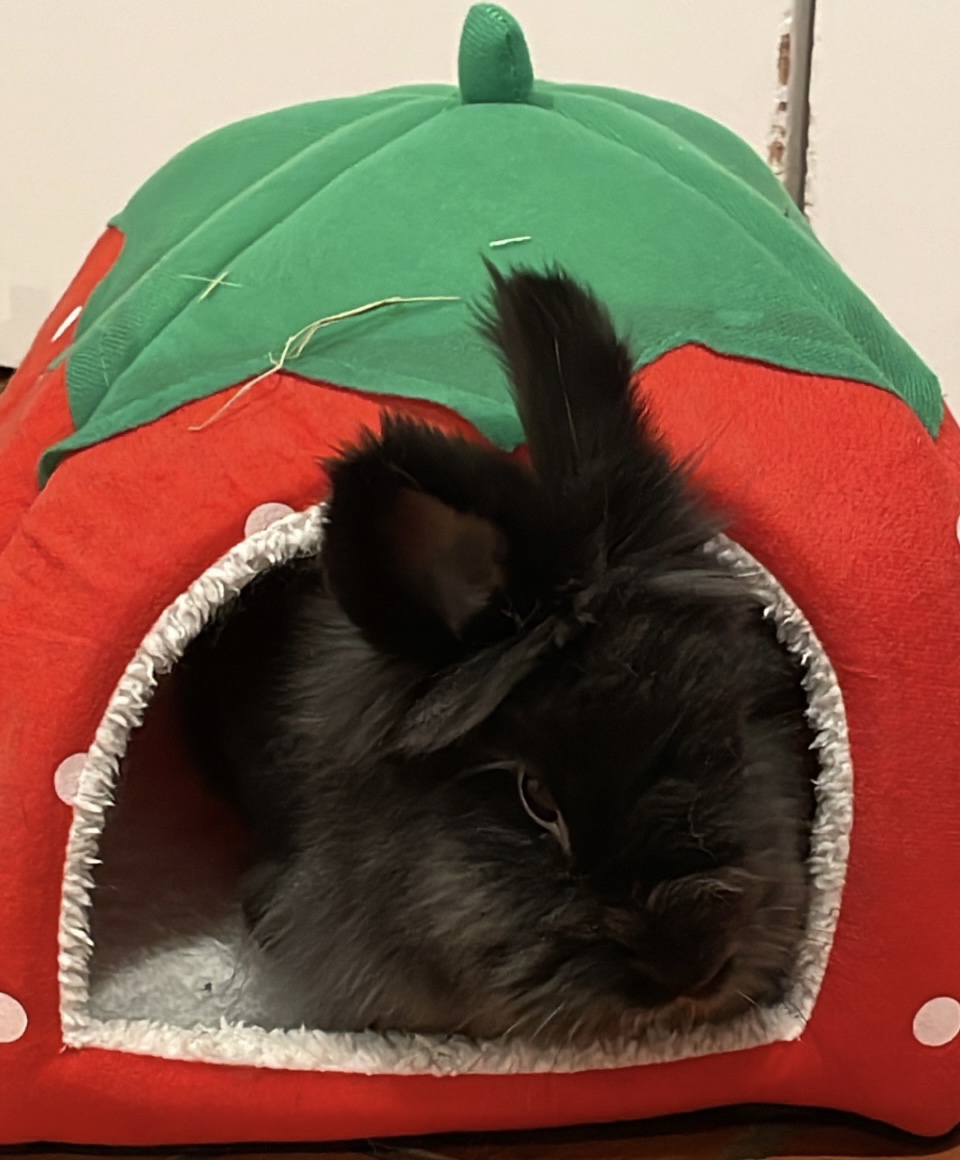 A photo of a black Lionhead rabbit with dark brown eyes, a short gray mane on top of his head and a long gray beard around the sides of his face and neck. His ears are perked up and he is peeking his head out of his small soft red house with white polka dots and green triangles on the top of each side, which is meant to resemble a strawberry. The background is white.
A photo of a black Lionhead rabbit with dark brown eyes, a short gray mane on top of his head and a long gray beard around the sides of his face and neck. His ears are perked up and he is peeking his head out of his small soft red house with white polka dots and green triangles on the top of each side, which is meant to resemble a strawberry. The background is white.Year & Major: I am a Junior majoring in Industrial Design
Passions and/or research interests: I am passionate about intersectionality and learning more about other’s identities and cultures that shape their lived experiences. I am interested in the lived experiences of disabled QTBIPOC. My special interests include history, medieval to renaissance, Chicano history, neurodivergence, and punk.
How I connected with the DCC: During my freshman year, I started to attend some online events the DCC hosted and contributed to the Disabled Latino/a/xs zine. I also participated in the DCC Community Care Cohort.
Ask me about Medieval history, The British royal family, music, food especially vegan food, the Sims, Monster High, and the show Reservation Dogs. I am happy to talk!
-
Theo Brumme (they/them/theirs)
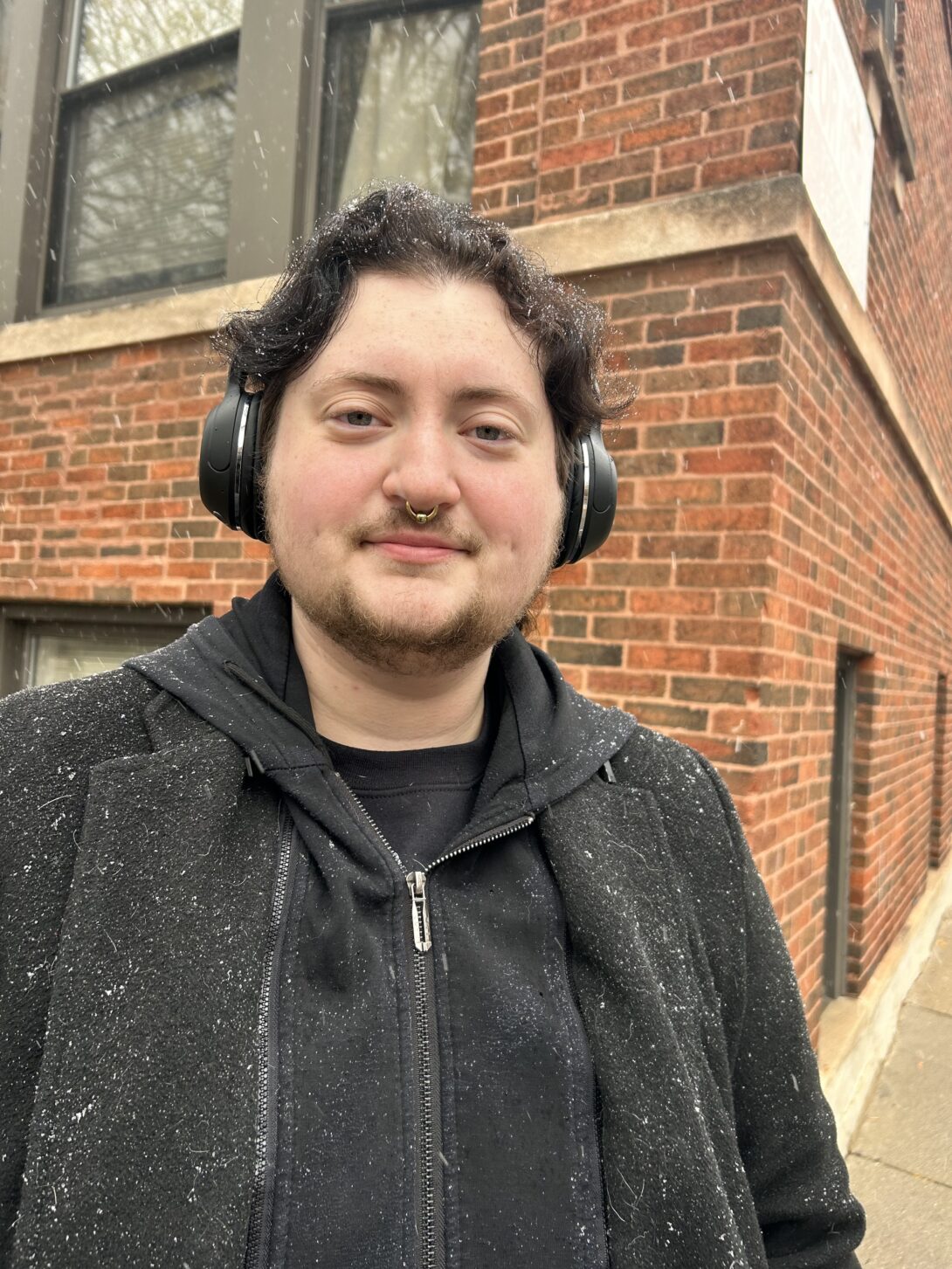 Theo is a white nonbinary person with a beard smiling for the camera. They are standing outside in front of a brick building while it is snowing. They are wearing a black jacket, over the ear headphones, and a large, silver septum ring.
Theo is a white nonbinary person with a beard smiling for the camera. They are standing outside in front of a brick building while it is snowing. They are wearing a black jacket, over the ear headphones, and a large, silver septum ring.Year & Major: 4th year, Interdisciplinary Education in the Arts (IDEAS) major and Disability and Human Development minor.
Passions and/or research interests: I am passionate about LGBTQ+ and disability activism. I specifically enjoy researching the intersection between disability, gender, and sexuality. I strive to include both disability and LGBTQ+ representation in the art I create.
How I connected with the DCC: I found out about the DCC through a friend who used to work here, and I instantly fell in love! I joined the Discord server and have found the DCC to be an incredible resource for support and inclusion.
Ask me about: I love talking about most things but I specifically know a lot about LGTBQ+ history, food, the Sims, and art!
Sunny Jeong-Eimer (they/them/theirs)
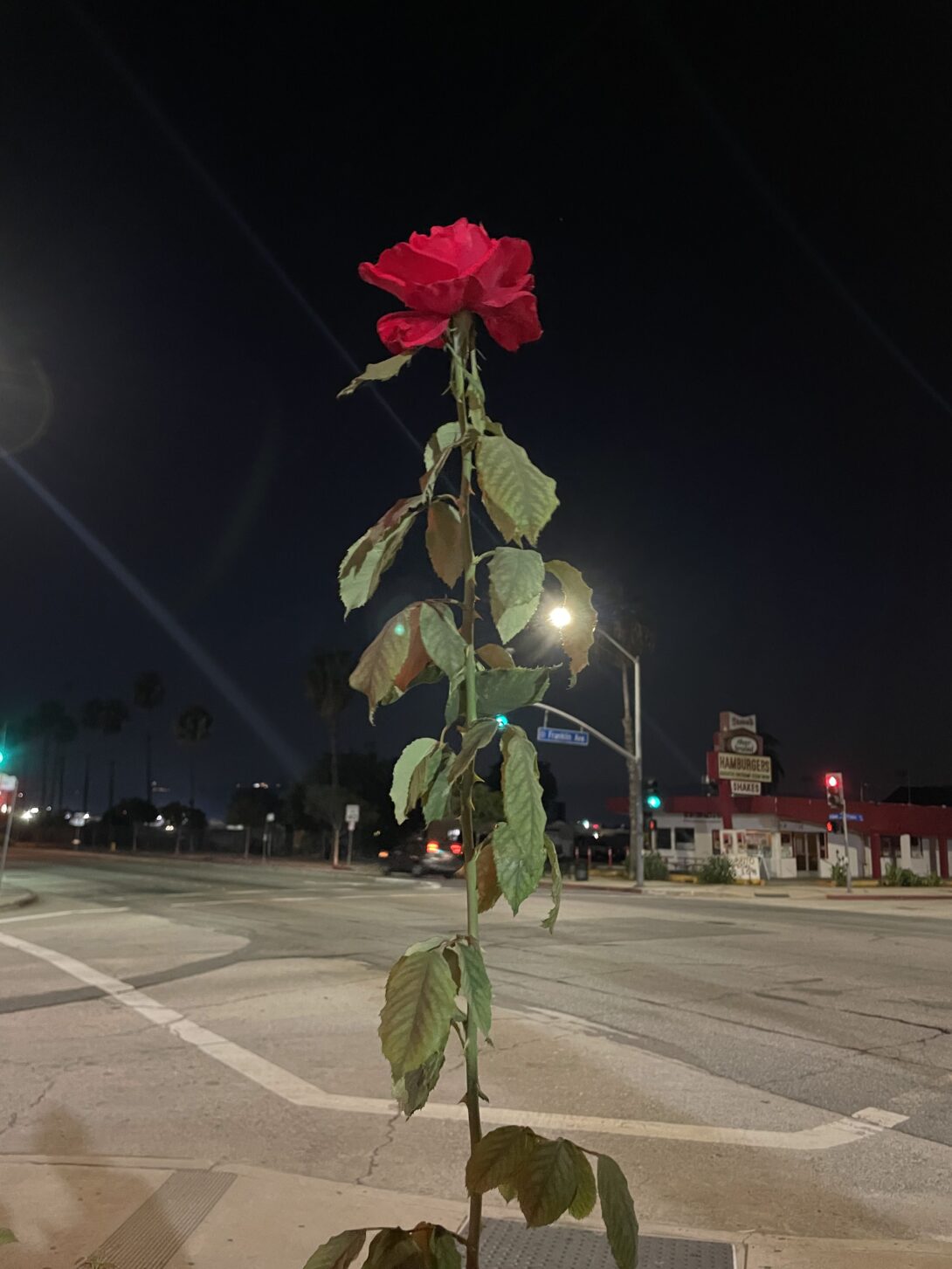 A red rose with a tall stem, studded with lots of dark green leaves and thorns, illuminated by a streetlight against a night sky. The rose is growing on the corner of an empty gray and white street intersection lined with silhouettes of palm trees. Across the intersection is a red-roofed white restaurant with a sign that reads “HAMBURGERS”.
A red rose with a tall stem, studded with lots of dark green leaves and thorns, illuminated by a streetlight against a night sky. The rose is growing on the corner of an empty gray and white street intersection lined with silhouettes of palm trees. Across the intersection is a red-roofed white restaurant with a sign that reads “HAMBURGERS”.Year & Major: Junior, English with a Gender & Women’s Studies minor
Passions and/or research interests: Lately, stream of consciousness writing, the lake, madness, disability and anti-imperialism, Korean diasporic art
How I connected with the DCC: Attended a Crip Paint event in the fall where I connected with the kind DCC community
Ask me about: Anything of the above and beyond [smile emoticon]
-
Mi Row (They/Them/Theirs, He/Him/His)
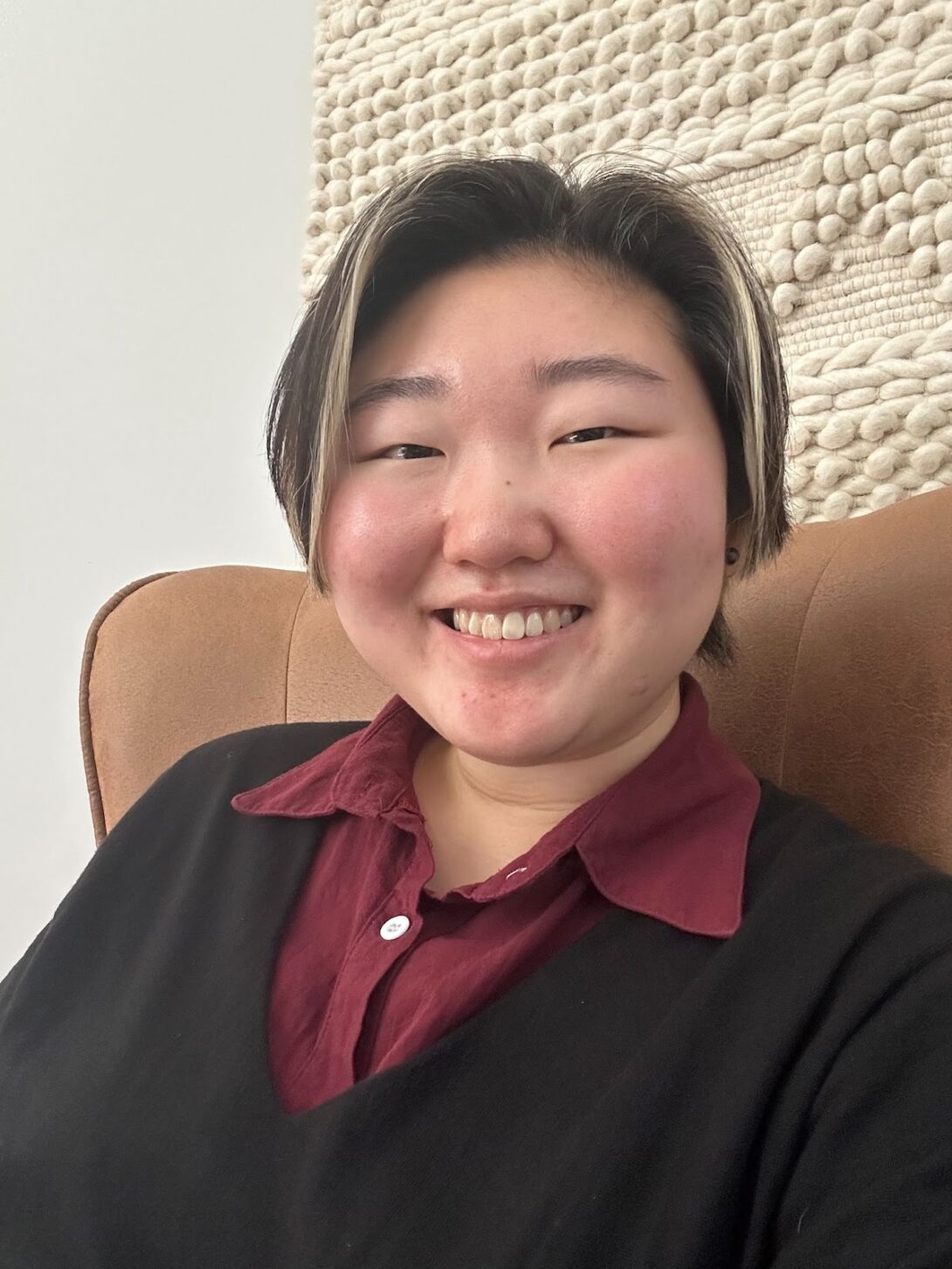 Mi is a smiling, fair-skinned Korean person with blonde highlights on black, short hair. They are wearing a maroon collared shirt underneath a black v-neck sweater, with a light brown chair and white knit wall piece in the background.
Mi is a smiling, fair-skinned Korean person with blonde highlights on black, short hair. They are wearing a maroon collared shirt underneath a black v-neck sweater, with a light brown chair and white knit wall piece in the background.I was born in Korea but raised in a small suburb of Cleveland, Ohio. I’ve been in Chicago for almost 3 years! I identify as a 1.5 gen immigrant, Korean American, neurodivergent & mentally ill, queer & genderqueer/trans. I was radicalized and raised as a community organizer in Columbus, Ohio during college by peers and leaders in the local community. I worked with mainly BIPOC or QTBIPOC community organizations and individuals to protest against violence against Black trans women, anti-Asian hate, and the continuous police murders of Black teenagers. I also organized a mutual aid group in Columbus, which blossomed & ended (with lessons learned). Some major influences in my life and work have been Black feminist writers & abolitionist thinkers: bell hooks, Audre Lorde, Mariame Kaba, Angela Davis; along with my chosen family & KQT siblings.
I am passionate about creating communities of abundance for QTBIPOC individuals in the Midwest and building relationships that feel meaningful and sustainable. My current hyperfixations include playing spider solitaire as a fidget/focus tool, making fried rice, jigsaw puzzles & board games, and rewatching “Running Man” (a Korean variety TV show). I’m also interested in poetry and embroidery!
I am currently attending UIC’s Master of Social Work program. I connected with the DCC for community & learning/celebrating all things disability justice!